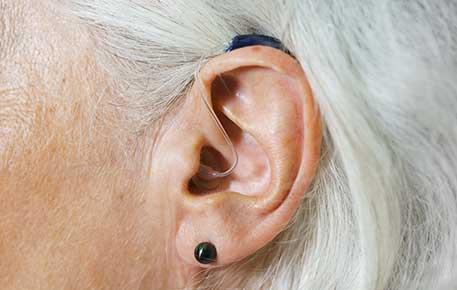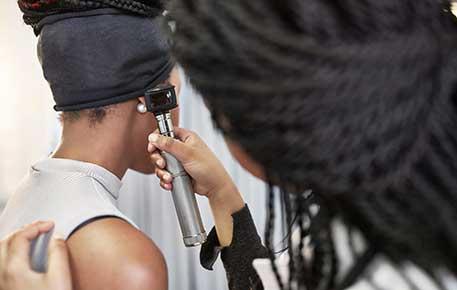Hearing & Balance
Make an Appointment
Disorders of the ear can affect hearing & balance . Some ear disorders cause slow changes over time in your ability to hear or keep your balance, while other disorders cause sudden symptoms such as hearing loss, dizziness, ringing, or pain. Hearing loss and balance problems can affect your ability to connect with the world and participate in social activities.
At UVA, our goal is to help you gain a clear idea of how your ears work so that you can understand your symptoms and how we can help.
Conditions & Treatments
- Acoustic neuroma
- Balance disorders
- Bone-anchored hearing aids
- Cholesteatoma
- Chronic ear infections
- Cochlear implants
- Dizziness and vertigo (benign positional vertigo)
- Ear drum perforation repair
- Facial paralysis, including Bell's palsy
- Hearing loss
- Meniere's disease
- Neurofibromatosis type 2
- Superior semicircular canal dehiscence
- Tinnitus (ringing in the ears)
- Tumors at the base of the skull on the hearing and balance nerve
- Vestibular neuritis and labyrinthitis
Hearing & Balance Services
- Audiology SpecialtiesSee All Audiology Services
Our audiologists provide many of the evaluations and therapies integral to your care. Together, we provide expert services and state-of-the-art technology to: Analyze balance problems Measure hearing Fit and program hearing implants
- Ear Infection TreatmentsSee If Ear Tubes Are Right For You
The delicate complexity of the ear requires a high level of skill and the right tools. UVA ear specialists understand how the ear interacts with the brain and nervous system. We'll evaluate your infection symptoms and discuss all the medical and surgical treatment options available to you. If you do have recurring ear infections, ear tubes might be the solution.
- ENT ExpertiseSee All of Our ENT Services
We make sure to fully evaluate the underlying causes of your hearing or balance symptoms. We collaborate with other specialists, such as neurologists, radiologists, and neurosurgeons, so that you get the best advice and care. You can trust us with your hearing or balance disorders, knowing you're getting care from a program ranked among the top 20 in the country.
Dizziness & Vertigo
Disorders of the ear can also cause dizziness, vertigo (the feeling of moving or spinning when you’re not), or balance difficulty. These symptoms can be caused by many different health issues, including inner ear disorders. It is very important to have an evaluation to find the cause of your symptoms. If our team finds that your symptoms are caused by an inner ear problem, we will recommend treatment options that may include:
- Canalith repositioning – a full body maneuver for a specific type of dizziness called benign paroxysmal positional vertigo, or BPPV
- Vestibular exercises – head and body movements that reduce your dizziness and improve your balance
- Injections in the ear to relieve the symptoms of Meniere’s disease, a disabling condition characterized by episodes of room-spinning vertigo and hearing loss
- Surgery – operations to relieve the symptoms of superior semicircular canal dehiscence or Meniere’s disease
- Fall prevention – falls are a major health issue in older adults; we will talk to you about strategies to prevent falls
If we find that your symptoms are not caused by an ear problem, we will refer you to the right specialist to help you.











